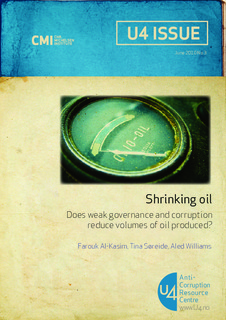| dc.contributor.author | Al-Kasim, Farouk | |
| dc.contributor.author | Søreide, Tina | |
| dc.contributor.author | Williams, Aled | |
| dc.date.accessioned | 2018-01-04T08:17:32Z | |
| dc.date.available | 2018-01-04T08:17:32Z | |
| dc.date.issued | 2010-06-18 | |
| dc.identifier | oai:www.cmi.no:3725 | |
| dc.identifier.citation | Bergen: Chr. Michelsen Institute (U4 Issue 2010-3) 34 p. | |
| dc.identifier.uri | http://hdl.handle.net/11250/2474765 | |
| dc.description.abstract | Prominent contributions to the resource curse literature suggest that weak governance and corruption are key factors behind continued poverty in resource-rich countries. How poor governance and corruption influence revenue management and the possible welfare benefits derived from oil are widely discussed. How they impact upon volumes of oil produced, however, attracts little attention. This U4 Issue paper addresses the basic forms suboptimal solutions in oil production may take. It aims to expand our understanding of how weak governance and corruption impact upon the oil sector and the possible welfare benefits derived from oil. Such explanations are of particular concern to donors and other actors engaged in policy reform and capacity building initiatives linked to oil governance in developing countries. | |
| dc.language.iso | eng | |
| dc.publisher | Chr. Michelsen Institute | |
| dc.relation | U4 Issue | |
| dc.relation | 2010:3 | |
| dc.relation.ispartof | U4 Issue | |
| dc.relation.ispartofseries | U4 Issue 2010:3 | |
| dc.relation.uri | https://www.cmi.no/publications/3725-shrinking-oil-does-weak-governance-and-corruption | |
| dc.subject | Natural Resource Management | |
| dc.subject | Oil | |
| dc.subject | Corruption | |
| dc.subject | Ghana | |
| dc.subject | São Tomé and Principé | |
| dc.title | Shrinking oil: Does weak governance and corruption reduce volumes of oil produced? | |
| dc.type | Research report | |
